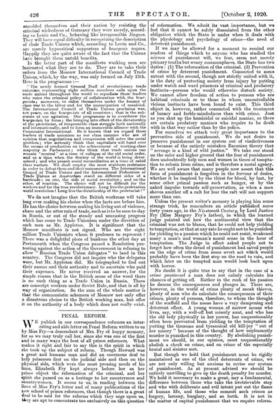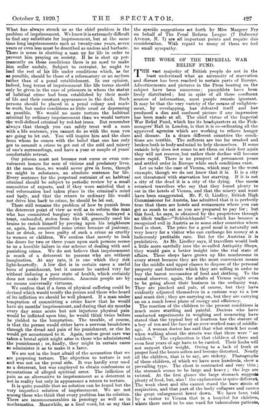PENAL REFORM.
WE publish in our correspondence columns an inter- esting and able letter on Penal Reform written to us by Miss Fry—a descendant of Mrs. Fry of happy memory, for so we may truly call her, since she was one of the first and in many ways the beat of all prison reformers. What makes it right and fair to say this is the spirit in which she took up the subject of reform. Though Howard was a great and humane man and did an enormous deal to help prisoners first on the judicial side and then on the physical side, which were the most pressing needs of his time, Elizabeth Fry kept always before her as her prime object the reformation of the criminal, and her spirit she passed on as a heritage to her countrymen and countrywomen. It seems to us, in reading between the lines of Miss Fry's letter and of many publications of the new school of prison reformers, that though there is a great deal to be said for the reforms which they urge upon us, trey are apt to concentrate too exclusively on this question
of reformation. We admit its vast importance, but we feel that it cannot be safely dissociated from the other obligation which the State is under when it deals with the physiology and psychology of crime—the need of deterrent punishment.
If we may be allowed for a moment to remind our readers of things which to anyone who has studied the science of punishment will, we fear, seem not merely primary truths but weary commonplaces, the State has two duties : (1) The reformation of the criminal. (2) Prevention of crime by deterrent punishment. Connected to some extent with the second, though not strictly united with it, is the duty of protecting society from injury by putting under watch and ward prisoners of criminal and predatory instincts—persons who would otherwise disturb society. We cannot allow freedom of action to persons who are habitual criminals or to those in whom uncontrollable vicious instincts have been found to exist. This third object is, however, rather connected with the treatment of lunacy and feeble-mindedness than with crime. Just as you shut up the homicidal or suicidal maniac, so there are certain predatory maniacs who require to be dealt with in that way rather than by the police. For ourselves we attach very great importance to the preventive side of punishment. We do not desire to preserve punishment in our system out of vindictiveness or because of the entirely mistaken Baconian theory that " revenge is a kind of wild justice." We take our stand on the safer and higher ground that the fear of punishment does undoubtedly help men and women in times of tempta- tion to refrain from crime, and is therefore a moral agency. We are well aware that many people now assert that this form of punishment is forgotten in the fervour of desire, whether it be inspired by the thirst for blood, by lust, by some other primal passion such as hunger, or by the naked impulse towards self-preservation, as when a man shoves another off a raft for fear the raft will not support more than one.
Unless the present writer's memory is playing him some strange trick, he remembers an article published some forty years ago, in the Nineteenth Century, by Lord Justice Fry (Miss Margery Fry's father), in which the learned judge pointed out how the sentimental view that the criminal was not to blame, that he could not help yielding to temptation, or that at any rate he ought not to be punished for yielding to a passion which he could not resist, weakened many a man's and woman's moral sense in the hour of temptation. The Judge in effect asked people not to forget how often the dread of punishment had saved people on the edge of crime from some overt act which would probably have been the first step on the road to ruin, and which later on the tempted man would look back upon with horror.
No doubt it is quite true to say that in the case of a crime passionnel a man does not calmly calculate his chances of getting off. Rather in the rush of his passion he damns the consequences and plunges in. There are, however, in the world of crime plenty of sneak thieves, plenty of men who do calculate the consequences of their crimes, plenty of persons, therefore, to whom the thought of the scaffold and the noose have a very dampening and deterrent effect. A young woman of narrow means who lives, say, with a well-off but miserly aunt, and who has the old lady physically in her power, has unquestionably often been prevented from yielding to the temptation of putting the tiresome and tyrannical old kill-joy " out of her misery " because of the thought of how unpleasantly murder is punished in this country. By abolishing punish- ment we should, in our opinion, most unquestionably abolish a check on crime, and on crime of the especially brutal and sinister sort.
But though we hold that punishment must be rigidly maintained as one of the chief deterrents of crime, we are not only willing but anxious to revise our system of punishment. As at present advised we should be entirely unwilling to give up the death penalty for murder. We hold it necessary to make a great, nay a fundamental, difference between those who take the irretrievable step and who with deliberate and evil intent put out the flame of human life, and those who commit such crimes as forgery, larceny, burglary, and so forth. It is not in the matter of capital punishment that we require reform. What has always struck us as the chief problem is the problem of imprisonment. We know it is extremely difficult to find any substitute for imprisonment, but at the same time long imprisonments such as twenty-one years, seven years or even less must be described as useless and barbaric. There is sense in shutting a man up for life in order to prevent him preying on society. If he is shut up per- manently on these conditions there is no need to make him suffer unduly. Subject to restraint, he ought to lead the rest of his life under conditions which, as far as possible, should be those of a reformatory or an asylum rather than of a penal establishment. In our opinion, indeed, long terms of imprisonment like life terms should only be given in the case of prisoners in whom the status of habitual crime had been established by their mode of life and their constant appearances in the dock. Such persons should be placed in a penal colony and made to work, but under conditions as little cruel or depressing as possible. We would no more torture the habitual criminal by ordinary imprisonment than we would torture the well-defined criminal by red-hot irons. But remember always that though you can safely treat well a man with a life sentence, you cannot do so with the man you are going to let out. You will inspire him and the class from whom he comes with the belief that one has only got to commit a crime to get out of the cold and misery of one's surroundings, and have a year or couple of years' comfortable retreat.
Our prisons must not become rest cures or even con- valescent homes for men of vicious and predatory lives. At the same time, we would never give in form, though we might in substance, an absolute sentence for life. Every sentence for the perpetual restraint of an habitual criminal should be subject to periodic review by a small committee of experts, and if they were satisfied that a real reformation had taken place in the criminal's mind and body, and that the return to ordinary life would not drive him back to crime, he should be let out.
There still remains the problem of how to punish from the deterrent point of view as well as to reform the man who. has committed burglary with violence, betrayed a trust, embezzled, stolen from the till, generally used his brains to enrich himself by preying upon his neighbours or, again, has committed some crime because of jealousy, lust or drink, or been guilty of such a crime as cruelty to women or children. We confess that merely to lock the doors for two or three years upon such persons seems to us a horrible failure in our scheme of dealing with and punishing crime. We do not believe that imprisonment is much of a deterrent to persons who are without imagination. At any rate, it is one which they risk light-heartedly. A low diet is in certain cases a useful form of punishment, but it cannot be carried very far without inducing a poor state of health, which certainly does not make for reformation. Anaemic people are by no means universally virtuous.
We confess that if a form of physical suffering could be devised which would terrify the person and those who heard of its infliction we should be well pleased. If a man under temptation of committing a crime knew that he would have six months' imprisonment, and during that six months every day some acute but not injurious physical pain would be inflicted upon him, he would think twice before he yielded to the temptation. The trouble, of course, is that the person would either have a nervous breakdown through the dread and pain of his punishment, or else he would get accustomed to it. Again, unless great care was taken a brutal spirit might arise in those who administered the punishment ; or, finally, they might in certain cases so administer it as to make it a farce.
We are not in the least afraid of the accusation that we are proposing torture. The objection to torture is not and was not on the penal side. It was hardly ever used as a deterrent, but was employed to obtain confessions or recantations of alleged spiritual error. The infliction of pain as an alternative to imprisonment as a deterrent is not in reality but only in appearance a return to torture.
It is quite possible that no solution can be found but the very imperfect solution of imprisonment. We are .not among those who think that every problem has its solution. There are incommensurables in penology as well as in mathematics. Meanwhile, as a final word, let us say that the specific suggestions set forth by Miss Margery Fry on behalf of The Penal Reform League (7 Dalmeny Avenue, N. 7) are all important points and require due consideration. With regard to many of them we feel no small sympathy.



































 Previous page
Previous page